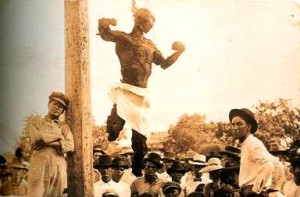Thoughts on Lynching and Disposable Black Bodies…
Below are some inchoate thoughts from me…
Some people spend their spare time reading “The Hunger Games.” I spend mine reading about the history of lynching. Potato/Potato. A couple of weeks ago, a reader reached out to me to ask why so many people were analogizing the killing of Trayvon Martin to a lynching (in particular to the lynching of Emmett Till). I haven’t had time to respond to the e-mail so I thought I would try to do so in this post.
I personally don’t see the killing of Trayvon Martin as perfectly analogous to lynching. Lynching is a historically specific form of racial terrorism as I see it. Usually it involved mob violence. However I do understand the temptation to return to the concept of lynching when thinking of the killing of unarmed black people. There has been a historical debasement of black bodies in the United States. We have always been considered killable and disposable. In the late 19th century, a remark was attributed to a Southern police chief who suggested that there were three types of homicides: “If a nigger kills a white man, that’s murder. If a white man kills a nigger, that’s justifiable homicide. If a nigger kills a nigger, that’s one less nigger (Berg, 2011, p.116).”The devaluing of black life is baked into the cultural cake of America, so to speak. I recently read an excellent book by Manfred Berg titled “Popular Justice: A History of Lynching in America.” In the book, Berg makes a convincing case that: “The slave codes singled out blacks for extremely cruel punishment, thus marking black bodies as innately inferior (p.11).” Folks, it is impossible to understand our modern criminal legal system without probing its origins in Colonial America. Berg argues that: “Colonial slavery set clear patterns for future racial violence in America (p.11).” Unfortunately, since it has been proven that American students’ most disliked subject is “history,” we seem doomed to operate as though everything old is new again.
Berg provides several examples of black lynchings for perceived and real slights. For example, when a young black person named Sandy Reeves dropped a five cent piece which was picked up by his employer’s 3 year old daughter, he snatched the coin out of her hands. He should probably have thought twice because the little girl ran crying to her parents telling them that Reeves had harmed her. The parents assumed that Sandy had sexually assaulted their daughter; he was lynched the next night. Apparently Sandy Reeves’ story was not an isolated case.
Black people who were lynched were usually first tortured and then once they were dead, their bodies were often mutilated. Sometimes the lynchers would drop the dead black person’s remains on the doorsteps of other blacks in the community as a warning that they too could meet this fate. This is a period in American history (from the mid-19th century to the early 20th century) that many people think they understand and yet have never actually studied.
I have several friends who are healers and they often talk about the fact that as black people we are dealing with ancestral traumas that are actually unexpressed. I think that there is something to this. Every time we hear of a young unarmed black person meeting with a violent and brutal death, something in our collective historical memories must be triggered.
So while I don’t believe that Trayvon Martin was lynched, I do appreciate the efforts that people have made to try to place his killing into some sort of historical context. Often we treat these incidents as though they are simply individual tragedies. The truth is that Trayvon Martin’s killing is unfortunately not exceptional rather it is part of a long line of injustices. This means that we should not mainly be focused on seeking individual redress (which is unfortunately where the preponderance of the efforts have understandably been focused). Trayvon Martin falls within a history of unarmed black people who have been victimized by racist terror in this country.
Modern day racial profiling is a form of violence that engenders constant vigilance in its victims and makes us afraid and uneasy. It keeps the idea at the forefront of our minds that we are potential targets and can always be objects of unlimited (and unaccountable) violence.
Finally, it always seems in America that punishment is in the service of the dominant culture’s interests. Recall the words of the anonymous Southern chief that I quoted above:
“If a nigger kills a white man, that’s murder. If a white man kills a nigger, that’s justifiable homicide. If a nigger kills a nigger, that’s one less nigger (Berg, 2011, p.116).”
Do we feel that this sentiment applies in 2012? If yes, then the legacy of lynching remains alive in 21st century America even if Trayvon Martin wasn’t a victim of this type of extra-legal violence. What matters is that we still have a culture in this country that sanctions the violation of black bodies often with impunity.

